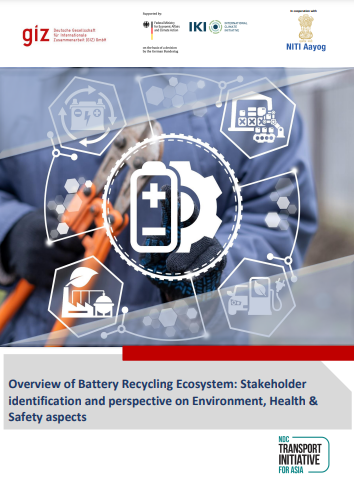
Overview of Battery Recycling Ecosystem: Stakeholder identification and perspective on Environment, Health & Safety aspects
Publication Year: 2023
Author(s): Sinha S J (NITI Aayog), Teja T (NITI Aayog), Sharma G (NITI Aayog), Mandal A (Deloitte India), Dikshit C (Deloitte India), Singha H (Deloitte India), Parihar A (Deloitte India), Tripathy A (Deloitte India), Mohapatra P (Deloitte India), Jain P (Deloitte India), Mishra S (Deloitte India), Bhagyasree (GIZ), Zhimomi T (GIZ)
Abstract:
To counter the increasing challenges arising from severe air pollution and climate change, a large-scale shift from internal combustion engine vehicles to electric vehicles (EVs) is considered one of the effective solutions to decarbonise the transport sector. However, accelerating the shift to electric vehicles requires a robust battery ecosystem in place. Under the Nationally Determined Contributions-Transport Initiative for Asia (NDC TIA) India Component of the regional programme, the study “Battery Ecosystem: A Global Overview, Gap Analysis in Indian context, and Way Forward for Ecosystem Development” was initiated by GIZ India and carried out by Deloitte Touche Tohmatsu India LLP. The objective of the study is to ensure the sustainability of traction battery supply chain through a multi-stakeholder approach. Published in May 2022, the first report under the study examined the status quo of traction batteries used in e-mobility applications. The report documented the current scenario of sourcing, manufacturing, assembling, reuse, and recycling of traction batteries in both Indian and global scenario.
With the escalation in the growth of EVs and associated battery production, the end-of-life management of the used batteries becomes a matter of utmost importance. The report focuses on providing an overview of battery recycling ecosystem from the perspective of stakeholder identification, risk identification, and its mitigation measures. The report includes a model template document, Environmental Health and Safety Risk Screening Framework, and Standard operating procedures for battery recycling ecosystem. The intent of this report is to guide new entities in the battery recycling ecosystem in identifying various stakeholders and their corresponding roles and responsibilities, permissions required for setting up battery recycling/refurbishing facilities, risks and corresponding mitigation measures, and standard operating procedures for safe handling of batteries. To read more on the Electric vehicle battery reuse ecosystem, kindly refer to the report on Technical and Economic Aspects of Battery Reuse developed under the same study.
Publisher/Organisation: Deutsche Gesellschaft für Internationale Zusammenarbeit (GIZ) GmbH
Rights: Deutsche Gesellschaft für Internationale Zusammenarbeit (GIZ) GmbH
URL:
https://greenmobility-library.org/public/index.php/single-resource/dW1jRk5yNE9CK1AvMG1Jb3dYYlpCdz09
Theme: Battery Technology | Subtheme: Recycling batteries
Related Documents
Research Papers/Articles
Can Product Service Systems Support Electric Vehicle Adoption?
Published Year: 2020
Abstract:
This research focuses on the question whether e-mobility product service systems (i.e. plug-in... Read More
Reports
Impacts of COVID-19 on Mobility
Published Year: 2020
Abstract:
The report outlines how passenger mobility trends in urban environments have been impacte... Read More



